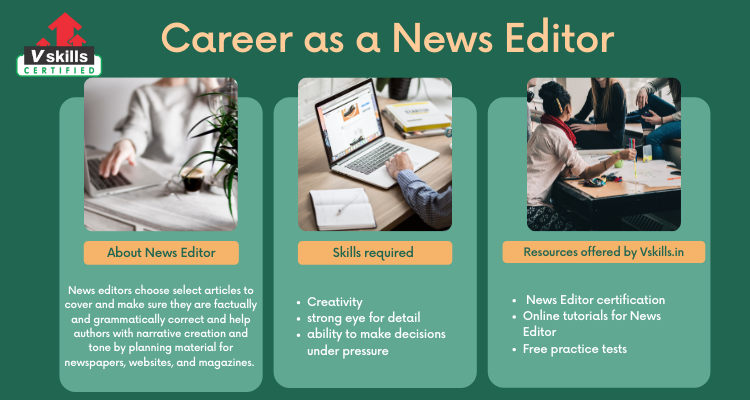A job as an editor may be right for you if you enjoy reading, have a way with words, have a creative bent of mind, are curious, and think critically. An editor is in charge of preparing language, pictures, and final content for publication in a newspaper, magazine, or website. An editor can work as a copy editor, editor-in-chief, or assistant editor, among other things. He or she will go through the writers’ work and make suggestions for improvements to their writing style, punctuation, and grammar.
Let us look at Career as a News Editor!
About News Editor
Fact-checking, fixing mistakes, and updating the information of news material sources are all part of news editing. News editors choose select articles to cover and make sure they are factually and grammatically correct. They could help authors with narrative creation and tone by planning material for newspapers, websites, and magazines. Entry-level roles are common for news editors, and competition for promotion into higher-level positions is often fierce.
Roles and Responsibilities of a News Editor
- Investigate and capitalize on various characteristics and demands of print and digital media to strengthen the editor’s position.
- Work within a creative environment to react to various competing priorities.
- Prepare work schedules and deadlines and inspire team members to engage targets to facilitate timely publication.
- Design and complete coverage strategies to promote wide coverage of all kinds of issues and news.
- Implement training to news reporters on how to choose news for existing readership and gain new readers.
- Control and produce news to give information with accuracy, flow, and within the time frame.
- Study innovative and unique solutions to optimize routine news coverage.
- Organize internal and external customer service to achieve optimum workflow.
- Evaluate all news for authenticity and neutralize with sources to ensure the correctness of published articles to avoid conflicts.
- Observe and use multimedia, nonlinear, and alternative storytelling policies to increase the readership base.
- Manage and publish content to cater to readers’ requirements and give detailed information for the same.
- Coordinate with colleagues in the newsroom and other departments to establish priorities for the same.
Eligibility
| Degree Level | Undergraduate or Bachelor’s degree |
| Degree Fields | Journalism, communication, or English; other backgrounds with strong writing skills and experience |
| Experience | 1-5 years of writing and editing experience, you can opt for multiple internships in case you are a fresher |
| Key Skills | Creativity; strong eye for detail; excellent communication and interpersonal skills; ability to make decisions under pressure |
Job Profiles
Copy editors Proofread the content for grammatical, punctuation, and spelling problems, as well as for readability, style, and compliance with editorial standards. They propose changes to enhance clarity and correctness, such as altering words and reordering phrases and paragraphs. They may also do research, double-check sources, and double-check facts, dates, and figures. They can also arrange page layouts for content, pictures, and advertisements.
Publication assistants Working at a book publishing firm allows you to read and assess submissions, edit uncorrected draughts, and address queries regarding previously published content. Small newspaper assistants may gather stories from wire services or the Internet, answer phones, and edit articles in smaller media areas.
Assistant editors are in charge of a certain topic, such as local, national, or worldwide news, feature articles, or sports. The majority of assistant editors work for publishers of newspapers, television stations, magazines, book publishers, or advertising and public relations agencies.
Executive editors You’ll be in charge of assistant editors and have the ultimate word on what stories are published and how they’re covered. Writers, reporters, and other staff are generally hired by executive editors. They also arrange budgets and negotiate contracts with freelance journalists, known in the news industry as “stringers.” Although many executive editors work for newspaper publishers, some work for television stations, periodicals, or public relations and advertising businesses.
Managing editors They are in charge of the everyday operations of a news section for magazines, newspaper publishers, and television broadcasters.
Salary and working environment
The majority of editors work full-time, and their schedules are dictated by production deadlines and the sort of editing role they have. Editors usually work in bustling offices, where they must contend with tight production deadlines and the demands of ensuring that the material they publish is accurate. As a result, editors frequently work long hours, particularly in the run-up to a publishing deadline. When an editor is working on digital content for the Internet or a live broadcast, these work hours might be much more frequent.
Here’s how much an editor makes throughout the course of their career:
| Level | Salary Package |
| Freshers | INR 3.3 LPA – INR 4.0 LPA |
| Mid-career professionals | INR 4.8 LPA – INR 5 LPA |
| Experienced | INR 5.2 LPA – INR 6.5 LPA |
Scope
Because employment in the publishing sector is expected to diminish, competition for positions with established newspapers and magazines will be particularly fierce. Editors who have adapted to online media and are comfortable writing for and using a range of electronic and digital tools will have the best job chances. Despite the fact that people’s media consumption habits have evolved, editors will continue to provide value by evaluating and editing draughts and maintaining a publication’s style and voice.
| Occupational Title | Employment, 2019 | Projected Employment, 2029 | Change, 2019-29 | |
|---|---|---|---|---|
| Editors | 118,700 | 110,000 | -7% (decline) | -8,700 (jobs) approx. |
Resources for News Editor
Before you can become an expert in desired areas, you must first build a solid base. Before you can move on to practical teaching, you’ll need to have the right applied skills. To gain better understanding of the domain, you can use the following tools:
- Firstly, Online Tutorials for Editing and content writing
- Also, Certification Courses from verified sources such as Vskills, Coursera, Udemy and so on. in content writing or some similar domain
- In addition, Online communities or groups for writers
- Moreover, Blogs and study material from experts in this field and many more.
Here are some examples of how you can improve your abilities:
- Freelancing
- Internships
- Apprenticeship programs
The above steps will help you to get this domain started. It’s a long way to go, however. You can take an advanced course to reach a new level of skills.
Some resources offered by Vskills
Vskills offer News Editor professional certification for all those interested in working in this field or in advancing their career. This certification course covers the following topics –
- Introduction
- Writing Techniques
- News Sources
- Developing Story Line By Line
- Selecting the News
- Prioritisation
- Editorial Values and Policies
- Structure
- Objectivity
- Legality
- Interviews
- Documentary and Feature Programmes
- Biographies
- Specialty Writing
- Science and Sports
- Disaster and Human Interest
- News Releases
- News Agencies
- The Internet
- Other Media
- Editorial Judgment
- Writing for Television
- Writing for Radio
- Pricing Together Video and Audio
Vskills also offers free practice tests and online tutorials to supplement the learning process. You can check them by clicking on the following links –
Discover the career opportunities and other prospects of Career as News Editor. Hurry up and start preparing now with Vskills.in!




